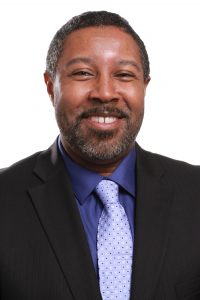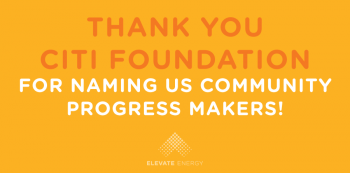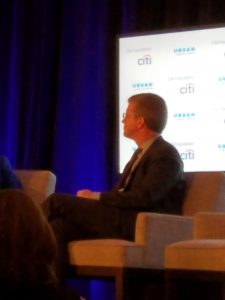Innovative, Collaborative Systems Change: Mr. Gillus Goes to Washington
This blog post is guest written by Elevate Energy Chief Operating Officer Delmar Gillus.
 I had the pleasure of attending the Citi Foundation Community Progress Makers Convening in Washington, D.C. As the area is also home for me, I was excited to see how D.C. was progressing, and to catch up with family and friends. The convening, Promoting Mobility: Putting Evidence to Action for Communities, was a two day, national event that brought together all 40 of the recipients of Citi Foundation’s Community Progress Makers grants.
I had the pleasure of attending the Citi Foundation Community Progress Makers Convening in Washington, D.C. As the area is also home for me, I was excited to see how D.C. was progressing, and to catch up with family and friends. The convening, Promoting Mobility: Putting Evidence to Action for Communities, was a two day, national event that brought together all 40 of the recipients of Citi Foundation’s Community Progress Makers grants.
Brandee McHale, President of Citi Foundation, kicked off the convening by illustrating that Community Progress Makers “serve both as safety nets for communities in economic distress and champions who break down silos and connect communities to greater social and economic opportunity.” As a member of the Chicago cohort, Elevate and the other members of our cohort had already begun to discuss how we could work together to address some of Chicago’s unique challenges in these areas.
 Unfortunately, the great work that is being done every day across the city, much of which is on a community level, doesn’t always make the evening news in Chicago. The Chicago cohort, which consists of Elevate, Delta Institute, Greater Englewood Community Development Corporation, Center for Economic Progress, and Preservation of Affordable Housing, is addressing a multitude of issues: youth development and training, reducing energy costs, affordable housing, financial literacy, job training, reducing the healthcare burden, and community development. By using our shared talents and expanding our coalition of partners, we can make real progress and show substantial results.
Unfortunately, the great work that is being done every day across the city, much of which is on a community level, doesn’t always make the evening news in Chicago. The Chicago cohort, which consists of Elevate, Delta Institute, Greater Englewood Community Development Corporation, Center for Economic Progress, and Preservation of Affordable Housing, is addressing a multitude of issues: youth development and training, reducing energy costs, affordable housing, financial literacy, job training, reducing the healthcare burden, and community development. By using our shared talents and expanding our coalition of partners, we can make real progress and show substantial results.
The members of our cohort have many synergies that can result in innovative programs to serve our city. Possible program areas that we discussed at the convening include:
- Financial, technical, and energy education for low-income and underserved communities
- Youth development and community leadership development
- Coalition/network building—bringing together community leaders, city and county government, and other NGOs to address Chicago-specific challenges (gun violence, education, poverty, and lack of job opportunities).
While our cohort may not be able to single-handedly address all of these issues, we could collectively be part of a broader effort through partnerships to take on some of the broader issues.
Each grantee is not only a part of a regional cohort (Chicago, Los Angeles, San Francisco, Miami, New York, and D.C.), but also of an affinity group. These focus on specific topics related to areas of expertise and the program areas we support. Elevate is in the Financial Capability affinity group, which primarily focuses on ensuring low-income and underserved communities have access to quality financial tools, education, and resources. Our group did a wealth of knowledge sharing that will improve everyone’s programs.
For instance, a few organizations in our affinity group focus on financial literacy and financial education, but adding energy literacy (specifically, how to read and understand utility bills) helps provide a more comprehensive curriculum for underserved markets of utility customers. Knowing that over 309,000 households in Illinois spend 26% of their annual income simply on home energy bills, we all agreed that providing education to understand utility costs and to potentially reduce them is crucial. We asked: how can we embed energy bill and energy education into financial literacy programs to provide a more comprehensive service to these communities?
 The event featured many dynamic speakers, but I was particularly impressed with Shaun Donovan, Director of the White House Office of Management and Budget. He spoke to the role of the government in solving community challenges, and emphasized that solutions need to focus on the needs of each specific community, not on generic cookie cutter programs. He also discussed maintaining a long-term view—doing the right things and being patient over time to allow the solutions to take hold.
The event featured many dynamic speakers, but I was particularly impressed with Shaun Donovan, Director of the White House Office of Management and Budget. He spoke to the role of the government in solving community challenges, and emphasized that solutions need to focus on the needs of each specific community, not on generic cookie cutter programs. He also discussed maintaining a long-term view—doing the right things and being patient over time to allow the solutions to take hold.
Other speakers that stood out to me included Brett Theodos and Sarah Gillespie from Anita Cozart, Deputy Director of the Center for Infrastructure Equity at Policy Link, outlined how engaged communities can partner with civic leaders to create fertile environments for affordable housing development.
As with any good conference, what’s most important is what you do with what you heard and learned. Moving forward, we are going to work with Chicago cohort members to identify community priorities to focus on that address the numerous local needs listed above. There are so many opportunities for our group to refine our strategies and goals, and then begin work that addresses these needs through collaboration. By utilizing each organization’s area of expertise, we can create comprehensive solutions that lead to healthier, vibrant, and more resilient communities.



